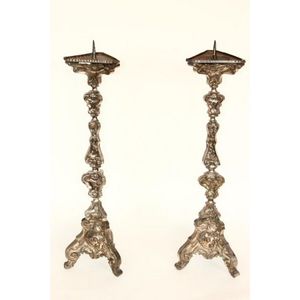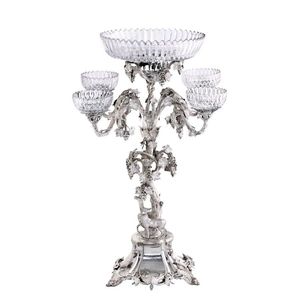Late Victorian Mappin & Webb Silverplate Epergne with Provenance
You must be a subscriber, and be logged in to view price and dealer details.
Subscribe Now to view actual auction price for this item
When you subscribe, you have the option of setting the currency in which to display prices to $Au, $US, $NZ or Stg.
- Victorian Period - The Victorian period of furniture and decorative arts design covers the reign of Queen Victoria from 1837 to 1901. There was not one dominant style of furniture in the Victorian period. Designers used and modified many historical styles such as Gothic, Tudor, Elizabethan, English Rococo, Neoclassical and others, although use of some styles, such as English Rococo and Gothic tended to dominate the furniture manufacture of the period.
The Victorian period was preceded by the Regency and William IV periods, and followed by the Edwardian period, named for Edward VII (1841 ? 1910) who was King of the United Kingdom and the British Dominions and Emperor of India for the brief period from 1901 until his death in 1910. - Circa - A Latin term meaning 'about', often used in the antique trade to give an approximate date for the piece, usually considered to be five years on either side of the circa year. Thus, circa 1900 means the piece was made about 1900, probably between 1895 and 1905. The expression is sometimes abbreviated to c.1900.
This item has been included into following indexes:
Visually similar items

W.M.F silver plate figural centrepiece, the cut glass bowl raised on a male figure, Germany, height 39 cm. Provenance: Orlando Brown Collection, Mosman

Pair of Italian silvered pricket sticks in Roccoo taste, a/f, height 77 cm, (2)

A Victorian sterling silver figural centre-piece with a semi-clad classical muse on a tripod leaf scroll base with presentation inscription 'To Edward Charles Cracknell by the Officers of the Electric Telegraph Department, News South Wales on his promotion

A Victorian silver plate centre-piece stand on triform base, with applied scrolls and flower heads, 44 cm high
